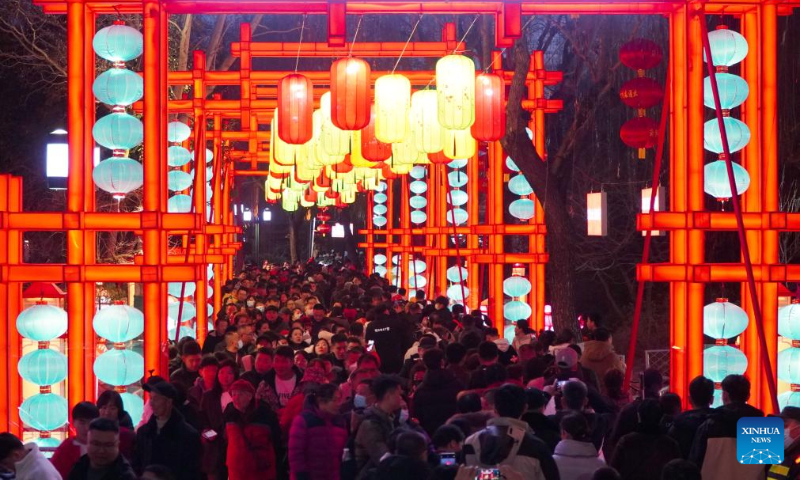China's outbound tourism thrives during Chinese New Year holidays, boosting global travel economy

People enjoy the lantern show at the Baotu Spring Park in Jinan, capital city of east China's Shandong Province, Feb. 11, 2024. Over 40 light installations have been arranged here during the Spring Festival holiday. (Xinhua/Xu Suhui)
China witnessed explosive growth in outbound tourism during this year's Spring Festival holidays (February 10-17), notably surpassing the figures for 2019. The surge in outbound travel from China hit back at hype by Western media outlets that attributed the global tourism slump to a decline in Chinese travelers.Leading internet and online travel platforms, including Alipay, Trip.com, Tuniu and Tongcheng Travel, released tourism statistics on Saturday, the last day of the 2024 Chinese New Year holidays, highlighting the vigorous development of China's tourism market. Significantly, outbound tourism emerged as a hot spot.
The resurgence in outbound tourism was attributed to several factors, including visa-free policies for Chinese tourists in some popular destinations.
According to a report that domestic online travel platform Trip.com sent to the Global Times, travel bookings for Thailand, Malaysia and Singapore - three visa-free countries - from China grew by more than 30 percent compared with 2019.
The increase in tourists marked the return of the Spring Festival holidays as a peak season for global tourism. According to Alipay, overseas spending by its users during the 2024 Chinese New Year holidays was 107 percent of the 2019 level, with the expenditure value increasing by 140 percent from 2023.
The allure of Chinese tourists was further boosted by targeted promotional efforts and Chinese New Year celebrations in various destinations, alongside services tailored to Chinese consumption habits, Jiang Yiyi, deputy head of the School of Leisure Sports and Tourism at Beijing Sport University, told the Global Times on Saturday.
During the Chinese New Year holidays, major international travel destinations including Dubai, Milan and Singapore went to great lengths to attract Chinese tourists,for example, by offering drone shows and Chinese-style festival events.
Belt and Road Initiative partner countries also saw a spike in Chinese visitors, with Saudi Arabia, the United Arab Emirates, Turkey and the Maldives experiencing significant increases in travel bookings. Chinese tourist arrivals in Saudi Arabia increased by over 800 percent from 2019, according to Trip.com.
"As China's outbound tourism continues to recover, albeit constrained by the slow recovery of international flights, it strongly counters narratives of a global tourism downturn due to fewer Chinese travelers," said Jiang.
Apart from outbound tourism, the positive impact of visa policy changes has also been evident in inbound tourism to China, with Trip.com reporting a 48 percent increase in inbound travel bookings compared with 2019.
Countries whose citizens were newly exempt from visa requirements to enter China, including France, Germany, Italy, the Netherlands, Spain, Malaysia and Singapore, saw a significant uptick in visitors, doubling the level in 2019, according to Trip.com.



